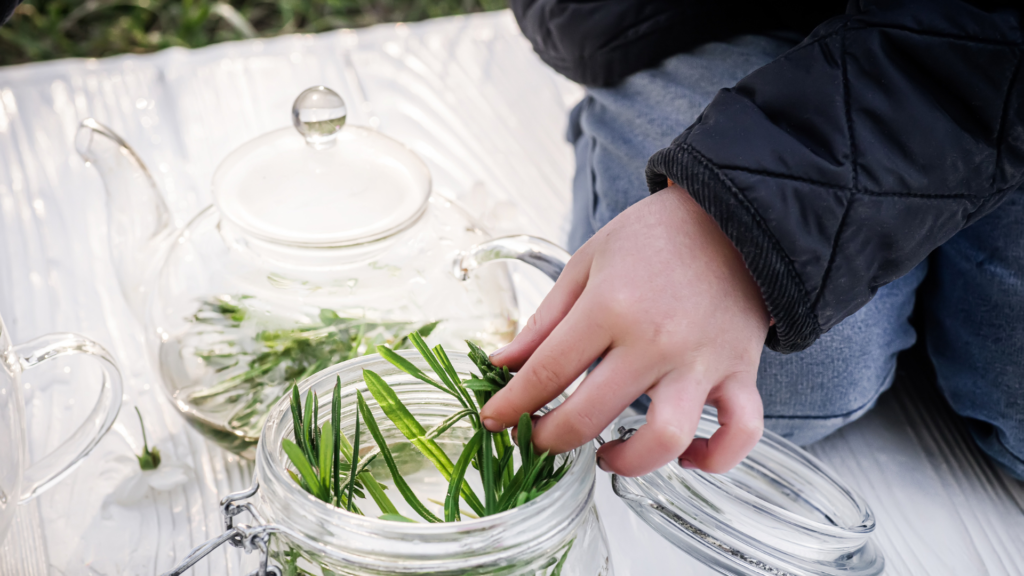Cleavers (Galium aparine) is probably a familiar plant to many. If you’ve ever touched this “sticky” herb, you’ll likely find it hitching a ride with you for a while, thanks to its clinging nature. Despite that, it is a gentle plant whose greatest benefits lie in its effects on the liver, urinary tract, prostate, blood, bodily fluids, lymph, and skin.

Introduction
Cleavers is an annual herb belonging to the Rubiaceae family. Native to Europe, North America, and parts of Asia, this sticky plant is easily recognized by the small hook-shaped hairs on its stems and leaves, which latch onto other plants, animals, and clothing. Throughout history, it has been valued for its wide range of uses in folk traditions and herbal medicine.
Traditional Folk Uses
In various folk traditions, Cleavers has served both practical and culinary purposes. One of its most common folk applications was as a natural strainer. Historically, the sticky stems were woven together to form temporary sieves, especially for straining liquids like milk.
Culinary traditions also utilized young shoots and leaves of sticky cleavers as a springtime green. When cooked, they become tender and nutritious, often added to soups or stews. Additionally, the seeds were roasted and used as a caffeine-free coffee alternative, providing a traditional substitute for regular coffee.
Medicinal Purposes
Since ancient times, the seeds of this plant have been well-known in herbal medicine, prized for their various healing properties. Different parts of the plant—leaves, stems, and roots—have been used in traditional remedies. The primary medicinal uses of Cleavers include:
Lymphatic System Support
Kibusis Lipikas is renowned for its role in supporting the lymphatic system. It’s believed to promote lymphatic drainage and improve lymph flow, helping to clear toxins from the body. Herbalists have traditionally used it as a diuretic to reduce swelling and treat conditions involving dryness and atrophy, as well as swollen glands
Skin Health
This herb has been employed to address various skin issues. Decoctions or infusions made from the plant have been used to treat conditions such as eczema, psoriasis, and wounds. Its anti-inflammatory and astringent properties help soothe irritated skin and aid in the healing process.

Urinary Tract Health
Cleavers is considered a valuable herb for urinary tract health. It acts as a diuretic, boosting urine flow and helping flush out toxins and bacteria. Consequently, it can be beneficial for urinary tract infections (UTIs), cystitis, and kidney stones.
Detoxification
Thanks to its diuretic and lymph-cleansing properties, Cleavers is often incorporated into detox protocols. It assists in eliminating waste from the body, supports overall detoxification, and reduces the burden on the liver and kidneys.
Anti-Inflammatory Qualities
Cleavers possesses anti-inflammatory effects, making it useful for alleviating inflammation in various parts of the body. It has historically been used to address conditions like arthritis, gout, and other inflammatory disorders.
Digestive Health
This herb has been utilized to support digestive well-being. It is believed to aid digestion and relieve gastrointestinal problems such as indigestion, bloating, and constipation. Its bitter compounds may help stimulate the secretion of digestive juices and enzymes.
Respiratory Health
In traditional medicine, Cleavers has been used to treat respiratory ailments. It was administered to help soothe coughs, bronchitis, and sore throats, offering relief for respiratory discomfort.
Modern Perspectives
Contemporary herbalists continue to use cleavers for many of the same purposes as their predecessors. Scientific studies have begun to explore the plant’s biologically active compounds—such as flavonoids, iridoid glycosides, and coumarins—which are responsible for its medicinal properties. Preliminary research indicates that cleavers exhibits antioxidant, anti-inflammatory, and antimicrobial activities, corroborating some of its traditional uses.
Cleavers is a versatile plant with a rich history of both folk and medicinal use. From its practical application as a natural sieve to its role in supporting the lymphatic and urinary systems, cleavers has proven to be a valuable resource in traditional medicine. While modern science is starting to uncover the potential benefits of this plant, herbalists continue to treasure cleavers for its gentle yet effective healing properties. As with any medicinal herb, it’s important to use it responsibly and consult healthcare professionals before incorporating it into your wellness routine.
